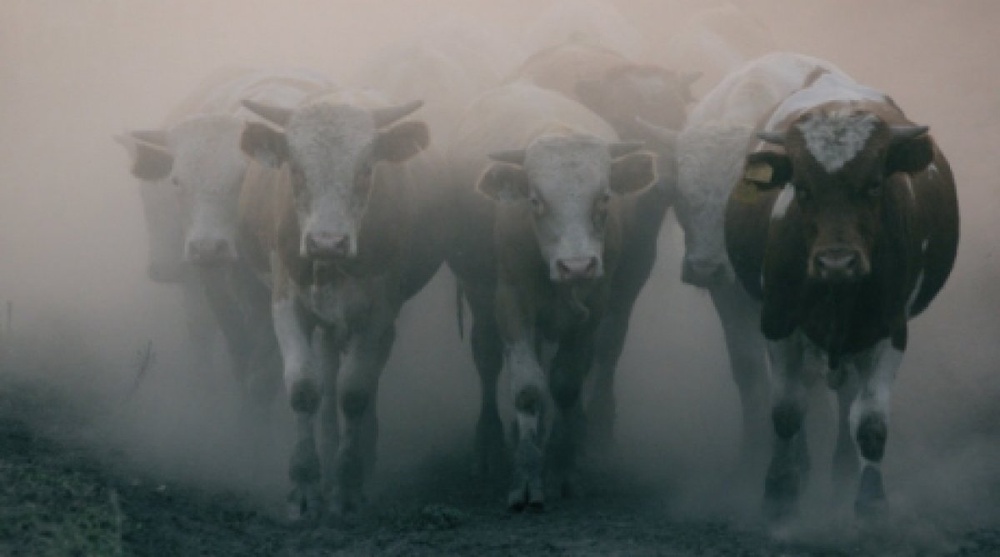
Former Kazakhstan Agriculture Minister and the current principal of Seifullin Kazakh Agrotechnical University Akylbek Kurishbayev considers the decision to import cattle a mistake, Interfax-Kazakhstan reports. “Two years ago, when KazAgro started developing a so-called meat project, the researchers and then the management of the Agriculture Ministry was against the aide of mass import of cattle into the country,” he told Interfax-Kazakhstan on February 12. According to him, back then the suggestion was to import a limited quantity of breeding cattle for selection process only. “Back then we analyzed the experience of cattle import in other countries, including Russia, where highly hazardous quarantine diseases were imported along with the purchased cattle. To support our suggestions we submitted letters and recommendations of leading breeding researchers of Russia,” Kurishbayev said adding that “unfortunately, nobody listened to the researchers”. The ex-Minister believes it unlikely that the supplier will compensate Kazakhstan for the losses incurred after the import of the cattle infected with Schmallenberg virus. “This is a fault of those who made a decision to import this cattle, first of all the management of our veterinary service. The “better safe than sorry” principle is not applied in the International Epizootic Bureau either,” Kurishbayev stressed. According to him, Kazakhstan Agriculture Ministry now has to “immediately eliminate the hotbed” of the hazardous disease, check all the cattle imported into the country over the last two years for this and other types of exotic diseases. Besides, according to the ex-Minister, it is necessary to “suspend mass import” of cattle to the country, and focus on improvement of the selection-breeding work on the existing livestock instead, as it had been suggested by the Kazakhstan scientists before. An agent of virus diarrhea and Schmallenberg disease was discovered in 722 cows imported to Leonov and Poltavskoye farms in North-Kazakhstan oblast in September 2012. Kazakhstan government decreed to exterminate the sick cattle along with the calves. On February 12 Kazakhstan Agriculture Minister Assylzhan Mamytbekov told the journalists that the supplier of Austrian cattle will reimburse the losses to the state and the farmers. The disease caused by Schmallenberg virus was initially registered in Germany. The new disease was named after the location of its first manifestation in August 2011 in three cows of the Federal Research Institute for Animal Health 80km from Cologne. The disease was then diagnosed in other EU countries. The virus has not been fully studied yet. Kurishbayev headed the Agriculture Ministry of Kazakhstan from April 2008 to April 2011.





Former Kazakhstan Agriculture Minister and the current principal of Seifullin Kazakh Agrotechnical University Akylbek Kurishbayev considers the decision to import cattle a mistake, Interfax-Kazakhstan reports.
“Two years ago, when KazAgro started developing a so-called meat project, the researchers and then the management of the Agriculture Ministry was against the aide of mass import of cattle into the country,” he told Interfax-Kazakhstan on February 12. According to him, back then the suggestion was to import a limited quantity of breeding cattle for selection process only.
“Back then we analyzed the experience of cattle import in other countries, including Russia, where highly hazardous quarantine diseases were imported along with the purchased cattle. To support our suggestions we submitted letters and recommendations of leading breeding researchers of Russia,” Kurishbayev said adding that “unfortunately, nobody listened to the researchers”. The ex-Minister believes it unlikely that the supplier will compensate Kazakhstan for the losses incurred after the import of the cattle infected with Schmallenberg virus.
“This is a fault of those who made a decision to import this cattle, first of all the management of our veterinary service. The “better safe than sorry” principle is not applied in the International Epizootic Bureau either,” Kurishbayev stressed.
According to him, Kazakhstan Agriculture Ministry now has to “immediately eliminate the hotbed” of the hazardous disease, check all the cattle imported into the country over the last two years for this and other types of exotic diseases.
Besides, according to the ex-Minister, it is necessary to “suspend mass import” of cattle to the country, and focus on improvement of the selection-breeding work on the existing livestock instead, as it had been suggested by the Kazakhstan scientists before.
An agent of virus diarrhea and Schmallenberg disease was discovered in 722 cows imported to Leonov and Poltavskoye farms in North-Kazakhstan oblast in September 2012. Kazakhstan government decreed to exterminate the sick cattle along with the calves. On February 12 Kazakhstan Agriculture Minister Assylzhan Mamytbekov told the journalists that the supplier of Austrian cattle will reimburse the losses to the state and the farmers.
The disease caused by Schmallenberg virus was initially registered in Germany. The new disease was named after the location of its first manifestation in August 2011 in three cows of the Federal Research Institute for Animal Health 80km from Cologne. The disease was then diagnosed in other EU countries. The virus has not been fully studied yet.
Kurishbayev headed the Agriculture Ministry of Kazakhstan from April 2008 to April 2011.


 +7 (777) 001 44 99
+7 (777) 001 44 99















































